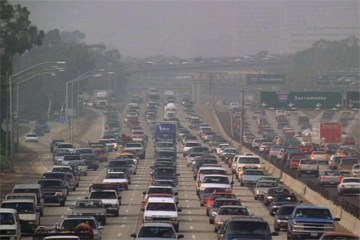A coalition of mayors wants Congress to declare a "Marshall Plan" against climate change by spending on mass transit to curb air pollution in their cities.
The mayors of Atlanta, Honolulu, St. Paul, Pittsburgh, and Portland, Ore., implored senators at a climate hearing on Capitol Hill last week to invest in renewable-energy programs in order to create jobs and fund bus and rail systems, with the goal of weaning people off gas-polluting vehicles.
The civic leaders touted the advances municipalities were already making to reduce greenhouse-gas emissions, such as converting car fleets to electric vehicles, redesigning streets for bike infrastructure, nurturing bus ridership by expanding service and adding bus-only lanes, and engineering buildings to become more energy-efficient.
But they stressed that new investment in transit would have an even bigger effect on our climate crisis.
"We are doing our part on the local level to address our climate crisis, but without significant federal action our efforts will not be enough," St. Paul Mayor Melvin Carter testified to the Special Committee on the Climate Crisis. "Communities across our country are counting on you to continue pushing this vital work forward, and we stand as ready teammates in the work ahead."
Pittsburgh Mayor Bill Peduto called for any climate-change programs to go beyond carbon reduction and consider "what the economic benefit will be, what the opportunities for employment will be, how this will help areas that have been left behind."
Honolulu Mayor Kirk Caldwell suggested that Congress create a national department focused on resiliency in order to make American climate-change policy less susceptible to partisan infighting.
And Atlanta Mayor Keisha Bottoms stressed that the rise in ground-level ozone has a social-justice dimension because of its disproportionate health effects on African-Americans, who are three times as like to suffer from asthma as white people.
“We see an average of 26,000 emergency room visits for asthma and wheezing in Atlanta every year and climate change will only make it worse,” she said.
The civic leaders were representing a group of 400 "climate mayors" who set goals to reduce gas emissions based on the Paris Climate Agreement. President Trump withdrew the United States from the accord in 2017 and has repeatedly attacked climate science and downplayed the effects of global warming, forcing Democrats to strategize about how they could keep the country focused on slowing climate change.
Democrats in both chambers have tried to advance the debate on climate change in recent months.
Oregon Senator Jeff Merkley reintroduced a bill in May that would reduce sales of gas spewing vehicles by 2030 and end sales entirely by 2040. And last week Massachusetts Senator Ed Markey along with Tennessee Congressman Steve Cohen introduced the Complete Streets Act which would compel states allocate 5 percent of federal transportation funds for the design and construction of streets that accommodate pedestrians, cyclists, strollers and wheelchairs.
Senate Democrats continue to hold hearings to garner climate change research and continue to holding hearings so they could begin passing legislation as soon as they retake the chamber — if that happens.
“The goal is to lay down the factual basis for taking action, so that if we are in charge in 2021, we don’t have to go through 18 months of investigatory hearings,” Hawaii Senator Brian Schatz told The Atlantic.
The Democratic-controlled House released the Green New Deal resolution to remake the U.S. economy and eradicate carbon emissions in February and passed the Climate Action Now Act to reinstate the U.S. in the Paris accord, although Senate Majority Leader McConnell thwarted both measures.
Last week, the House Transportation and Infrastructure Committee questioned Federal Transportation Authority officials why they were sitting $2.4 billion in funding for transit projects in cities and states across the country, delays which have added to $845 million in added costs for transit agencies.
Meanwhile, climate-savvy mayors will tout transit systems and resiliency programs that save energy and cut carbon emissions while demanding federal dollars to clean the air. They're the ones living in smoggy cities, after all.
“Our ground transportation system needs to adapt with the times and move toward more biking, walking, mass transit, renewable-fueled vehicles, and other new mobility options if we are to succeed in meeting our goals,” Caldwell said. “We have to do this together, with the state and other stakeholders.”






